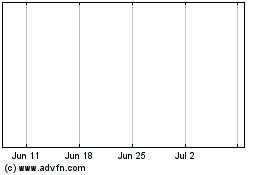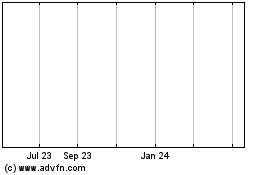By Anupreeta Das
Few of the Berkshire Hathaway Inc. shareholders flocking to
Omaha this weekend have heard of Samuel Katz. But many of them
wouldn't be making the pilgrimage were it not for a fight he had
with Warren Buffett two decades ago.
A relatively exclusive club owned Berkshire's shares back in
1996 when they were trading for about $33,000 apiece. That year,
Mr. Buffett introduced a new class of B shares. They had limited
voting rights, but cost just a thirtieth of the price of their more
expensive brethren, making the stock affordable to mom and pop
investors.
Mr. Buffett's grudging decision to create the so-called "Baby
Bs" didn't occur in a vacuum. The catalyst was Mr. Katz and people
like him who were setting up mutual fund-like vehicles that would
round up investors who couldn't afford to buy Berkshire shares
outright.
The Berkshire chief executive had long defended the
conglomerate's high stock price as a virtue that encouraged
long-term ownership and deterred speculative trading. But he also
didn't like the idea of letting others profit from Berkshire, so he
decided to issue lower-priced shares himself as an alternative.
The B shares have been a resounding success, broadening
Berkshire's appeal and helping cement Mr. Buffett's near-mythic
legacy. The shares, which in 2010 underwent a 50-for-1 stock split,
currently trade for about $147 each. The original shares, which
have never split, trade at roughly 1,500 times that, about $220,000
apiece.
Attendance at the company's annual meeting jumped from 5,000
people in 1996 to five times that within a decade. Last year, more
than 40,000 people showed up.
Mr. Katz, a onetime Philadelphia politician and self-described
civic entrepreneur, never bought a B share, but he still relishes
the role he played in changing Berkshire's course.
"I consider it a badge of honor," he says of his run-in with Mr.
Buffett and his longtime sidekick, Charlie Munger. "I got into it
with Warren Buffett and Charlie Munger, and they were conscious of
little me."
Mr. Buffett said he was glad things had worked out. "Almost
every time something negative has occurred -- except for medical
problems of mine or those close to me -- in retrospect the problem
has been a net plus in my life, usually by a very significant
margin," he said in an email Wednesday.
Mr. Munger didn't respond to a request for comment.
Mr. Katz had spent his career in finance and politics, including
a failed run for Pennsylvania governor in 1994. In the mid-1990s,
with the eldest of his four children about to go to college, he
plowed most of the money he'd saved for their tuition into four
Berkshire shares at a cost of about $19,000 each.
After brainstorming with another Berkshire shareholder about
ways to make the company accessible to small investors, Mr. Katz
looked into creating a vehicle called a unit investment trust. The
idea was to solicit money from small investors and use the funds to
buy stock in Berkshire.
Mr. Katz spent a month holed up in the guest bedroom of his
in-laws' summer home in North Carolina with a stack of 20 Berkshire
annual reports. The result, in the fall of 1995, was an entity he
planned to call The Berkshire Trust. Draft marketing materials said
the trust would invest in "one thing and one thing only." Buyers of
the units were promised "access to the world's greatest
investor."
Mr. Katz wrote Mr. Buffett what he calls a "fawning,
groupie-like" letter outlining his plan. The Oracle of Omaha was
not amused. He dispatched Mr. Munger and Robert Denham, then the
chairman of Salomon Brothers, to swat Mr. Katz away. In phone
calls, meetings and letters, Mr. Buffett's emissaries warned Mr.
Katz that Berkshire could undercut his efforts by splitting the
stock or creating a new class of shares, according to Mr. Katz's
recollections.
Under pressure, Mr. Katz decided to change the name of his
company to the Affordable Access Trust and to cut the commission he
was planning to charge. But he plowed ahead in the hope of raising
as much as $250 million, figuring Mr. Buffett was bluffing.
"I remember thinking, 'Is this that big a deal to you?'" he
says.
It was. In his 1996 annual letter to shareholders, Mr. Buffett
said such trusts went against the long-term interests of existing
shareholders, because demand for units would likely cause a
speculative bubble in Berkshire's stock. Moreover, he wrote, "they
would have used our past, and definitely non-repeatable, record to
entice naive small investors and would have charged these innocents
high fees and commissions."
That year, Berkshire announced plans to create the new class of
B shares. (The original shares became known as A shares.) In May
1996, Berkshire issued 517,500 B shares, raising $565 million in
net proceeds. Mr. Katz eventually abandoned his idea.
"As a guy who had spent time in the securities industry, it was
the largest securities transaction I was involved in for which I
got paid nothing," Mr. Katz says.
Eventually Mr. Buffett came to acknowledge -- if not approve of
-- Mr. Katz's pivotal role. "Actually the B has worked out well for
everyone, so in a strange way we may owe one to Mr. Katz -- though
not due to any good intentions on his part," Mr. Buffett wrote in
1997 to another Berkshire shareholder who had sent the billionaire
a press clipping about the Katz fight.
Mr. Katz soon retreated from the financial world. He ran three
times, unsuccessfully, for mayor of Philadelphia. Now the
66-year-old is a documentary filmmaker. Among his projects is a
14-episode history of Philadelphia, currently airing on the local
ABC affiliate.
Mr. Katz sold his Berkshire A shares when the time came to pay
for his children's college tuition. He had paid close to $80,000
for the four shares. Within a decade, he sold them for more than
$290,000. He often thought of buying the B shares, but "every time
I looked at them I was reminded of the events of the past and
thought I'd best pass," he says.
"I'm glad Sam made money out of Berkshire through ownership
rather than through obtaining high fees from unsophisticated
investors," Mr. Buffett said.
And after all that, Mr. Katz's family has still found a way to
profit from Berkshire's huge fan base. His youngest son, Benjamin
Katz, is a pilot stationed at the Offutt Air Force Base near Omaha,
Neb., who in the past has rented out his apartment to shareholders
in town for the annual meeting.
Write to Anupreeta Das at anupreeta.das@wsj.com
(END) Dow Jones Newswires
April 28, 2016 05:44 ET (09:44 GMT)
Copyright (c) 2016 Dow Jones & Company, Inc.
Berkshire Hathaway (NYSE:BRKA)
Historical Stock Chart
From Mar 2024 to Apr 2024

Berkshire Hathaway (NYSE:BRKA)
Historical Stock Chart
From Apr 2023 to Apr 2024
